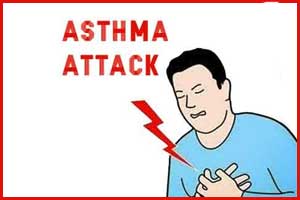- Home
- Editorial
- News
- Practice Guidelines
- Anesthesiology Guidelines
- Cancer Guidelines
- Cardiac Sciences Guidelines
- Critical Care Guidelines
- Dentistry Guidelines
- Dermatology Guidelines
- Diabetes and Endo Guidelines
- Diagnostics Guidelines
- ENT Guidelines
- Featured Practice Guidelines
- Gastroenterology Guidelines
- Geriatrics Guidelines
- Medicine Guidelines
- Nephrology Guidelines
- Neurosciences Guidelines
- Obs and Gynae Guidelines
- Ophthalmology Guidelines
- Orthopaedics Guidelines
- Paediatrics Guidelines
- Psychiatry Guidelines
- Pulmonology Guidelines
- Radiology Guidelines
- Surgery Guidelines
- Urology Guidelines
Mepolizumab significantly reduces exacerbation in Severe Eosinophilic Asthma

A new study published in the Journal of Allergy and Clinical Immunology found that in patients with severe eosinophilic asthma (SEA) having similar blood eosinophil counts, mepolizumab was associated with significantly greater improvements in clinically significant exacerbations and asthma control compared with reslizumab or benralizumabin.
William Busse et al. conducted a study to compare the efficacy of licensed doses of mepolizumab, benralizumab and reslizumab in patients with the SEA.
Currently, 3 anti-interleukin (IL)5 pathway-directed treatments (benralizumab, mepolizumab, reslizumab) have been approved by the Food and Drug Administration for the treatment of severe asthma with an eosinophilic phenotype.
The researchers extracted the data from the Cochrane review of anti-IL5 pathway-directed therapies developed in severe asthma. Studies eligible for inclusion in the indirect treatment comparison (ITC) were required to meet a pre-defined PICOS (Population; Intervention; Comparator; Outcomes; Study Design) framework.
The populations consisted of patients with SEA aged ≥12 years. Interventions included only those assessing approved doses or formulations of licensed anti-IL5 pathway-directed treatments (mepolizumab 100 mg subcutaneously [SC] 4 weekly [Q4W]; reslizumab 3 mg/kg Q4W; benralizumab 30 mg Q8W [3x 4 weekly doses followed by 8 weekly dosing]). The comparators included placebo only. The outcomes included in the analysis were clinically significant exacerbations.
Key study findings:
- Compared with placebo, all treatments significantly reduced the rate of clinically significant exacerbations in each baseline blood eosinophil threshold subgroup.
- However, only mepolizumab and reslizumab significantly reduced the rate of exacerbations requiring ER visit/hospitalization.
- When comparing treatments against one another, mepolizumab significantly reduced the rate of clinically significant exacerbations compared with benralizumab and among patients with baseline blood eosinophil counts ≥400 cells/µL.
- There was no difference in exacerbation reduction between reslizumab and benralizumab.
- In patients with baseline blood eosinophils ≥150 cells/µL and ≥300 cells/µL, mepolizumab significantly reduced the rate of clinically significant exacerbations compared with benralizumab
- For exacerbations requiring ER visit/hospitalization, no significant differences were observed between any two treatments in any subgroup assessed.
Read Also: Tezepelumab designated as breakthrough therapy for Severe Asthma
The study concluded that Mepolizumab significantly reduced the rate of clinically significant exacerbations by 34%–45% compared with benralizumab across all baseline blood eosinophil count thresholds, and by 45% compared with reslizumab in the ≥400 cells/µL subgroup.
“The aim of this analysis was to provide relevant information based upon comparative phenotypic characteristics for clinicians to help inform treatment choices for patients with SEA and our results show statistically significant improvements in ACQ score with mepolizumab, benralizumab and reslizumab versus placebo in all subgroups assessed”, write the authors.
For reference log on to http://10.1016/j.jaci.2018.08.031

Disclaimer: This site is primarily intended for healthcare professionals. Any content/information on this website does not replace the advice of medical and/or health professionals and should not be construed as medical/diagnostic advice/endorsement or prescription. Use of this site is subject to our terms of use, privacy policy, advertisement policy. © 2020 Minerva Medical Treatment Pvt Ltd